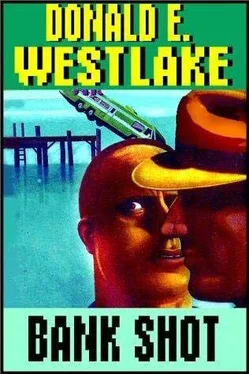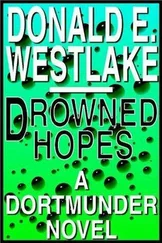“What’s that over there?”
“What?”
“I said, what’s that over there?”
“Looks like some kind of church.”
“Let’s go look at it.”
Murch turned in that direction. “Keep your eye peeled for a gas station,” he said.
This current car — he’d had it seven months — had started life as an American Motors Javelin, but since he’d owned it Murch had changed some things. By now, looks aside, it bore about as much similarity to a Javelin as to a javelin. It growled like some very large and savage but sleepy beast as Murch steered it through bumpy streets of prewar one family housing toward the church with the sagging roof.
They stopped out front. The lawn was weedy, the wooden walls needed painting very badly, and a few of the window panes were broken. “Let’s take a look,” Murch’s Mom said.
Murch shut off the ignition and listened attentively to the silence for a few seconds, as though that too could tell him something. Then he said, “Okay,” and he and his Mom got out of the car.
Inside, the church was very dim; nevertheless, the priest sweeping the central aisle saw them at once and hurried toward them, clutching his broom at port arms. “Yes? Yes? Can I help you?”
Murch said, “Never mind,” and turned away.
His Mom explained, “We were wondering if this place was abandoned.”
The priest nodded. “Almost,” he said, looking around. “Almost.”
* * *
“I think I have an idea,” May said.
* * *
Kelp said, “Excuse me, Miss. I wanted to open an account.”
The girl, her head bent beneath a towering bouffant hairdo, didn’t pause in her typing. “Have a seat, and an officer will be right with you.”
“Thank you,” Kelp said. He sat down and glanced around the interior of the bank, as a bored man will do while waiting.
The safe was down at the Kresge end and more impressive-looking than Victor had implied. It filled practically the whole width of the trailer down there at the end, and the door — which was ajar — was admirably large and thick.
The customer portion of the bank was separated from the rest by a chest-high partition, with here and there an entrance door through it. If one were to take the top off the trailer and look inside, this chest-high partition would form a letter C, long and thin and with right angles instead of curves. The customer area was the part enclosed by the C — the right half of the middle of the trailer. At the top of the C was the safe, down along the side of the C were the tellers, and the thick bottom of the C contained the desks of the three bank officers. The girl in the bouffant hairdo was at a smaller desk outside the C; she and the elderly bank guard were the only employees in the customer section.
Kelp cased the joint, and then he memorized it, and then he got up and read the pamphlets for auto loans and credit cards, and then he looked around the place again to be sure he remembered it all, and he remembered it all. He’d planned on actually opening an account, but finally that seemed superfluous, so he got to his feet and told the girl, “I’ll come back after lunch.”
The hairdo nodded. She kept typing.
* * *
“Why,” Herman said, “from the outside it looks like any other garage.”
Victor nodded, smiling. “I thought you’d like it,” he said.
* * *
Dortmunder came out of the bedroom wearing black sneakers, black trousers and a long-sleeved black shirt. In one hand he was holding a black cap, and over his forearm hung a black leather jacket. May, who was hemming curtains, looked up and said, “You off?”
“Be back pretty soon.”
“Break a leg,” May said and went back to her sewing.
The railroad-station parking lot had cars in it all night long on weekends, and this was Friday night, so there was no problem. Victor and Herman arrived in Victor’s Packard, parked it and strolled over to the waiting room. This was the Long Island Railroad, which had been the best in the world since November of 1969. The waiting room was open and lit, since late trains came out here from the city on Friday nights, but the ticket office was closed. Victor and Herman wandered around the empty waiting room reading the notices until they saw headlights; then they went back outside.
It was the Javelin, growling contentedly to itself as though it had just eaten a Pinto. Murch was driving and Dortmunder was beside him. Murch slipped the Javelin into a parking space — it was done like a samurai sheathing his sword, the same sense of ceremony — and then he and Dortmunder got out and walked over to join the other two.
Dortmunder said, “Kelp isn’t here yet?”
Victor said, “Do you suppose he had some trouble?”
“Here he comes,” Herman said.
“I wonder what he brought me,” Murch said as the truck headlights made the turn into the parking lot.
The town all around them was fairly well lit but basically empty, like a movie set. Traffic was light to moderate with people homeward bound from their Friday-night outings, and the occasional Nassau County police car was interested in drunken drivers, automobile accidents and potential burglary of downtown stores, not vehicles moving in and out of the railroad-station parking lot.
Kelp pulled to a stop next to the waiting men. His style of driving was in deep contrast with Murch, who seemed to do no physical labor at all but to operate his cars by thought control. Kelp, on the other hand, even after the truck had come to a stop, could still be seen in there for several seconds turning the wheel and shifting the gears, pushing and pulling and shoving and only gradually himself coming to a stop, like a radio that keeps broadcasting for a few seconds after you switch it off, while the tubes cool.
“Well,” said Murch, in the manner of a man withholding judgment but not expecting much.
It was a good-sized truck, a Dodge, with a box about fifteen feet long. The doors and sides carried the company name: Laurentian Paper Mills. In addition, the doors bore the names of two cities: “Toronto, Ontario — Syracuse, New York.” The cab was green, the box dark brown, and it had New York plates. Kelp had left the motor running, and it gug-gugged like any truck engine.
Now, as Kelp opened the door and climbed down to the pavement, carrying a brown shopping bag, Murch said to him, “What was it attracted you to this thing? In particular, I mean.”
“The fact that it was empty,” Kelp said. “We don’t have to unload any paper.”
Murch nodded. “Well,” he said, “it’ll do.”
“There was an International Harvester I saw,” Kelp told him, “with a nice racing stripe on it, but it was full of model cars.”
“This one’ll do,” Murch said.
“If you want, I’ll go back and get that one.”
“No,” Murch said judiciously, “this one will do just fine.”
Kelp looked at Dortmunder and said, “I don’t believe I’ve ever met such an ingrate in my life.”
“Let’s go,” Dortmunder said.
Dortmunder and Kelp and Victor and Herman got up into the back of the truck, and Murch closed the van doors after them. Now the interior was pitch-black. Dortmunder felt his way to the side wall and sat down, as the others were already doing. A second later, the truck lurched forward.
The worst moment was the bump coming out of the parking lot. After that, Murch moved them along pretty smoothly.
In the dark, Dortmunder wrinkled his nose and sniffed. “Somebody’s been drinking,” he said.
Nobody answered.
“I can smell it,” Dortmunder said. “Somebody had a drink.”
Читать дальше












